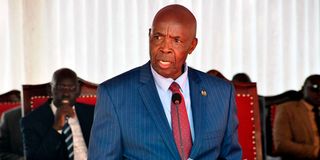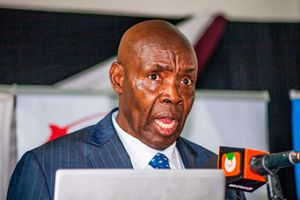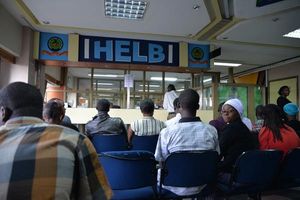
Education Cabinet Secretary Ezekiel Machogu.
Kenyans are spending billions of shillings to educate their children in private schools due to declining quality of learning in public ones despite paying huge taxes to finance basic education, a study by the Nation indicates.
The analysis also shows that successive governments have failed to match population growth with expansion of public education infrastructure, thereby causing congestion in schools and compromising the quality of education offered.
Parents and other stakeholders who spoke to the Nation said that a gradual process of “forced privatisation” has taken root, especially at early childhood education development (ECDE) and primary school levels.
Questions now arise over accountability of funds meant for the education sector, which was allocated over Sh668 billion in the current national budget, translating to about 30 per cent of government expenditure. Curiously, the full amount in the budget does not reach schools as they are owed billions by the government in unremitted capitation.
Families with children of school-going age who live in urban areas are most affected by lack of public schools and therefore turn to private education. Education Cabinet Secretary Ezekiel Machogu has admitted that close to 70 per cent of children in Nairobi County attend private institutions. He added that of the 48,000 mean grade Es in the 2023 Kenya Certificate of Secondary Education (KCSE) examinations, Nairobi accounted for 10,000 of them.
Mr Machogu said that lack of investment in public education in the city had created a huge shortage of schools, which private entrepreneurs had come in to plug. He said that his office, together with the county education department, will establish a special task force to vet private schools on their compliance with Ministry of Education guidelines on establishment of learning institutions.
“We’re operating in a very bad structure in Nairobi; something we must remedy. We’ll identify public land in collaboration with the county government to establish more public schools and also engage the private sector to support our efforts,” Mr Machogu said.
Also Read: The sham that is Kenya's free education
According to data from the ministry, there are 216 public ECDE centres, 211 primary schools, 193 junior schools, and 107 secondary schools in Nairobi County, serving an estimated population of five million people.
Conversely, there are 952 private ECDE centres, 780 primary schools, 672 junior schools, and 207 secondary schools. This indicates that nearly 71 per cent of the educational institutions in the capital city are privately owned, putting to question the government’s commitment to its responsibility to provide free and compulsory basic education.
Mr Machogu said that the quality of education that is offered in some private schools is wanting, with many of them failing to meet set standards.
“Parents often have no choice but to send their children to these unregistered schools due to limited options. This highlights a significant problem requiring urgent attention. We want the task force that will be formed to look into that,” he said.
Eric Munene, an accountant living in Nairobi, told the Nation that many parents have lost faith in public education in primary schools because of congestion, lack of teachers and inadequate facilities.
“We don’t take our children to private schools out of choice. We’re forced by our current circumstances. I’d take my children to a Roysambu Primary School which is near where I live and benefit from my taxes but the population at the school is about 3,000. There’s definitely competition for resources, including teachers,” he said.
His three children attend a private primary school in Kasarani where the fees per term is about Sh70,000, exclusive of transport and other expenses like textbooks. This is money, he says, parents could use for personal development and other needs.
Another parent, Elizabeth Kioko, said that parents invest more in the education of their children in private schools so as to secure them places in public secondary schools which are better resourced, have maintained the quality of education and are affordable. However, she said, this is also slowly changing due to congestion in public secondary schools and parents who can afford are opting for private schools.
“Many parents prefer to enrol their children where learning is perceived to be going on; the numbers are low and there’s personalised learning. They take the learners to a semblance of what the parents think would be of quality even if it is a kiosk. It’s unfortunate that even teachers in public schools take their children to private schools, even those that they know have compromised certain standards of infrastructure,” Kenya Union of Post Primary Education Teachers Secretary-General of the Akello Misori said.
Over the last 20 years, establishment of private schools has been on the rise nationally, especially at primary school level, as neglect of public schools has pushed more parents away.
According to the Kenya National Bureau of Statistics, when the National Rainbow Coalition took over from the Kanu government in 2002, there were 17,683 public primary schools against 1,441 private ones. At the time, the national population was estimated at 33.7 million and enrolment in primary schools stood at 6,371,200.
By the time the Jubilee government was exiting in 2022, public schools had grown to 23,631 (33.5 per cent) while private ones had multiplied by 513.3 per cent to 8,838, and the national population was estimated at 54 million, with 10,364,200 learners enrolled in primary schools.
“When the 2010 Constitution guaranteed all learners the right to education, there was an age of awakening that brought with it challenges that have never been managed. Then we have the most inefficient Parliament in terms of allocating and appropriating resources to sensitive issues like health and education. Yet they have the audacity to invite the CS for Education to ask him why they haven’t sent money to schools when the victim is the CS,” said Mr Misori.
According to official data for Nairobi County, only 22,525 children attend public ECDE centres against 85,380 in private ones. At primary school level, 270,494 learners are enrolled in public schools against 315,246 in private institutions.
At secondary level, public schools have a higher enrolment at 88,478 compared to 27,385 in private ones. However, a significant number of public secondary schools in Nairobi are categorised as national and therefore admit learners from all over the country.
In addition, to the formal schools, there are 160,301 learners enrolled in alternative provision of basic education and training institutions, which are all run by private entities.
Mr Misori expressed fear that transition from junior to senior school might be affected because of the manner in which the curriculum has been implemented in the former.
“We’re not ready for senior school. The foundation for the pathways isn’t properly laid. There’s no infrastructure and human resources in primary schools for all learning areas and it appears no one cares about what will happen,” he said.
Additional reporting by Mercy Simiyu












